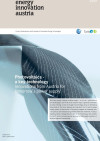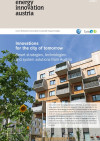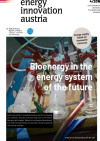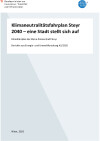Suchergebnisse für "Factsheet: Energietechnologien gestalten, die für alle sinnvoll und nutzbar sind"
Presentation of the effective use of innovative bioenergy technologies in the Austrian energy system of the future (BioEff)
The study shows possibilities and strategies for the effective use of innovative bioenergy technologies in Austria.
Elaboration of the conditions to build up a reuse-cycle network for WEEE
Selection of electrical and electronic equipment disposed as waste back into a reuse-cycle, bulding up an operational network between social enterprises, linking up and improving the workflows necessary for this purpose and the creation of a second-hand-shop for electrical an electronic equipment.
Evaluation of temperature differentiation on a room-by-room basis in passive house apartments
In the passive house Utendorfgasse a room–by-room temperature control was installed in 11 apartments. The experiences were evaluated from a technological and from a sociological point of view.
PassiveHouseDataBase - International Passive House and Passive House Plus Database
About 3.000 buildings are documented, all of them show a high level of comfort and follow energy and building technique standards for passive houses and plus-passive houses. By integration of object and evaluation data, the database will become the worldwide basis for extremely energy efficient buildings and because of its multilingualism and quality assurance opens up new sustainable export possibilities.
KlimaStadtLinz2030: Linz and its path to climate neutrality by 2030 - Preparation for the EU - Mission “100 Climate-neutral Cities by 2030”
The research project investigates whether and how it is possible for the city of Linz to achieve climate neutrality by 2030 within its own sphere of influence. A common vision, which is being developed with the citizens in a participatory manner, unites the opportunities that arise for the city through the measures necessary for this goal.
Investigation of Industrial Processes (IEA- Solar Heating and Cooling Program, Task 33)
The central aim of this international research cooperation is to make industrial processes accessible for solar thermal plants. To achieve this aim basic information is elaborated and components as well as system engineering concepts are developed. Furthermore the intention of Task 33/IV is to survey a detail state of the art in the field of solar process heat that has a validity for Europe. The work of JOANNEUM RESEARCH - Institute of Sustainable Techniques and Systems focuses mainly on the contents of Subtask B.
Oekosan 09 - International symposium for high-quality energetic renovation of large-scale buildings
From October 7 to 9, 2009 the AEE INTEC has organized an international symposium "Ökosan 09". The emphasis of the symposium was the communication of (partial) results of running and closed cooperation projects by leading technical experts dealing with the retrofit of large-scale buildings.
Photovoltaics - a key technology

Innovations from Austria for tomorrow`s power supply
energy innovation austria
2/2017
Herausgeber: BMVIT und Klima- und Energiefonds
Englisch, 8 Seiten
Downloads zur Publikation
Innovations for the city of tomorrow

Smart strategies, technologies and system solutions from Austria
energy innovation austria
4/2016
Herausgeber: BMVIT und Klima- und Energiefonds
Englisch, 16 Seiten
Downloads zur Publikation
Bioenergy in the energy system of the future

Energy supply based on renewable resources.
energy innovation austria
4/2019
Herausgeber: BMVIT und Klima- und Energiefonds
Englisch, 12 Seiten
Downloads zur Publikation
City Cooling - Intelligent district cooling implementation, Vienna
Development of an intelligent district cooling concept and alternative solutions for heat rejection from central absorption chillers at the example of the neighbourhood TownTown in Vienna.
Austrian World Summit
20. Juni 2017
Hofburg Wien, Michaelerkuppel, 1010 Wien
The AUSTRIAN WORLD SUMMIT will bring together leading politicians, businesses, civil society & NGOs, start-ups, representatives of regions and cities as well as scientists and experts to develop and discuss solutions to important future issues. This forum will offer an international network platform to accelerate the realization of sustainable projects and to showcase successful factors of best practice projects in consideration of the UN Sustainable Development Goals.
EM Städte - Monitoring and evaluation of urban energy flows
In the first phase of the project, the data source of the energy statistics will be analyzed. Based on the findings of the analysis a methodology on build up regional energy balances will be developed. The methodology will be integrated into the Senflusk tool and tested on five reference cities in Austria.
EnergieAudioAkademie - Development and usage of audiofiles for the training of professionals from the building sector
Important issues in building energy efficiency will be prepared as audio files. The target groups are builders and plumbers. The files complement existing training and educational programs and will be disseminated via CDs and/or USB sticks to the target groups via craftsmen networks and an internet platform.
Energy-Sponge: The Building as an Energy-Sponge - Electricity In - Heat Out
Innovative, dynamic control concepts had been developed which enable (air) heat pumps in combination with PV- or renewable grid electricity to use the building mass of a multi-familiy house as heat storage. User acceptance had been evaluated and possible business models had been developed.
Klimaneutralitätsfahrplan Steyr 2040 – eine Stadt stellt sich auf

Klimafahrplan der Klima-Pionierstadt Steyr
Schriftenreihe
42/2025
Stadt Steyr, PlanSinn Planung und Kommunikation GmbH, e7 energy innovation &
Herausgeber: BMIMI
Deutsch, 29 Seiten
Downloads zur Publikation
Digital transformation of the Austrian construction industry and its impact on employment
What are the impacts of the digital transformation of the Austrian construction industry on this sector’s labour market? By looking at the next five to ten years it will be analysed whether and to what extent digital applications lead to an increasing, falling or stagnant demand for employees in the construction industry and in construction occupations.
GREEN BIOREFINERY - Technical, economic and ecological optimisation of value chains by the introduction and efficient use of sustainable raw materials (SUSPRISE Joint Call)
Green Biorefinery stands for the sustainable and highly integrated processing of green biomass into multiple products. The project deals with the assessment and development of required technology for selected feedstock and evaluates market potential for out-products as well as the implementation potential for introduced processes.
Connection of innovative strategies and technologies to a holistic, resources-friendly plus energy building (FUTUREbase)
On the basis of a construction project in Giefinggasse 4 in Vienna the combination of new, innovative strategies and technologies to an integrated, resources conserving plus energy building with high signaling and multiplication effect had been tested for feasibility. A regional, energetical bond between the buildings TECHbase, ENERGYbase and the Klima-Windkanal had been developed.
CellPor - cellulose polymerized - new methods for the processing of a polymer-cellulose-foam according to ecological criteria in construction
The development of a spray applicable cellulose composite as insulating material on the basis of renewable resources, combined by the development of a prototype for the spray-on technology for processing the new, water free cellulose composite are the demanding challenges of this project.
